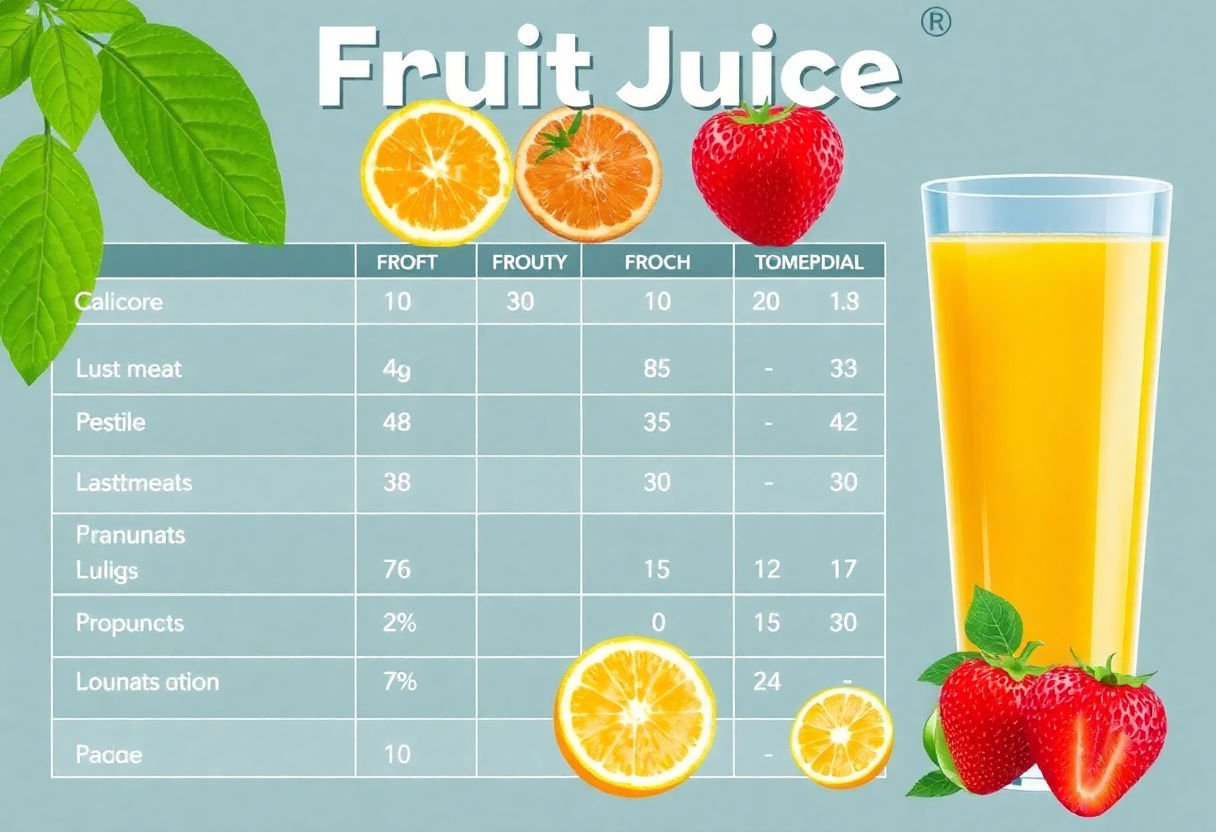In today’s world, the significance of real fruit juice in a balanced diet has gained immense recognition among health-conscious individuals. With its rich array of vitamins, minerals, and antioxidants, real fruit juice offers substantial health benefits, from boosting immune function to supporting digestive health. Unlike sugary beverages, it provides a natural and nutritious alternative that aids in hydration and weight management. However, it is essential to consider potential drawbacks to maximize its advantages. This article delves into the myriad benefits and considerations of incorporating real fruit juice into daily life, encouraging a healthier lifestyle.
Key Takeaways
- Consuming real fruit juice regularly provides essential vitamins, minerals, and antioxidants that can significantly boost overall health.
- Real fruit juice enhances immune function, helping to protect against common illnesses and infections.
- Drinking real fruit juice can aid in digestion and improve gut health due to its natural fiber content.
- It can serve as a hydrating and nutritious alternative to sugary drinks, contributing positively to overall hydration.
- Despite its benefits, moderation is key, as excessive consumption can lead to increased calorie intake and potential dental concerns.
Nutritional Value of Real Fruit Juice

Real fruit juice is a powerhouse of essential vitamins and minerals that contribute significantly to a healthy diet. The consumption of various fruit juices, such as orange, apple, and cranberry, provides an abundance of key nutrients that are vital for maintaining good health.
Vitamins: Real fruit juices are notably rich in vitamins such as Vitamin C, Vitamin A, and some B vitamins. For instance, a glass of orange juice can provide more than double the daily recommended intake of Vitamin C, which is crucial for skin health and immune function. Carrot juice, on the other hand, is an excellent source of Vitamin A, known for supporting eyesight and skin.
Minerals: Various minerals can also be found in fruit juices. For example, pomegranate juice contains significant amounts of potassium, critical for heart health and muscle function. Similarly, calcium-fortified juices can contribute to the daily calcium needs, supporting bone health.
Antioxidants: Antioxidants such as flavonoids and polyphenols are prevalent in many fruit juices. These compounds help in reducing oxidative stress and inflammation, lowering the risk of chronic diseases. Grape juice is particularly high in these antioxidants, which may contribute to improved heart health.
Fiber: While most of the fiber in fruits is lost during the juicing process, some juices, especially those with pulp, retain a modest amount of dietary fiber beneficial for digestion.
In summary, real fruit juice, when consumed in moderation, can be a highly nutritious component of one’s diet, delivering a range of vitamins, minerals, and antioxidants essential for overall well-being.
Boosting Immune Function

Real fruit juice, packed with essential nutrients, plays a pivotal role in enhancing immune function, offering a natural defense against various ailments. The richness of vitamins, particularly Vitamin C found abundantly in citrus fruits like oranges and grapefruits, is known to boost the production of white blood cells, which are vital for fighting infections. A daily intake of these juices can fortify the body’s natural defenses.
Moreover, many real fruit juices are loaded with beneficial antioxidants, such as flavonoids and phytonutrients, which aid in combating oxidative stress. This reduction in oxidative stress may lower the risk of chronic diseases, thereby maintaining a healthy immune system. For instance, pomegranate and blueberry juices are lauded for their high levels of antioxidants, which promote cell health and regenerative processes.
In addition to vitamins and antioxidants, real fruit juices typically contain significant amounts of folate, which assists in generating new cells and may reduce the risk of infections. Folate-rich juices like those from papayas and kiwis provide these essential benefits, supporting overall immunity.
Enzymes and beneficial compounds found in fruit juices, such as beta-carotene in carrot juice, also contribute to strengthened immunity. Beta-carotene, once converted into Vitamin A in the body, helps maintain mucous membranes, creating a formidable barrier against pathogens.
Including a variety of these nutrient-dense juices as part of a balanced diet can provide the body with a daily boost, enhancing its ability to ward off infections and remain resilient against seasonal illnesses.
Supporting Digestive Health

Real fruit juices offer numerous benefits beyond just taste, notably in supporting digestive health. These juices are rich in natural enzymes and dietary fiber, both of which play crucial roles in facilitating healthy digestion.
Natural enzymes found in fruits like papaya and pineapple are known for breaking down proteins, aiding in smoother digestion. Bromelain in pineapple juice and papain in papaya juice are excellent examples of these enzymes. They help reduce bloating and discomfort, enhancing the digestive process.
Dietary fiber is another essential component found in real fruit juices. Although whole fruits contain more fiber, certain juices also deliver significant amounts. Fiber is vital in maintaining regular bowel movements and preventing constipation. Apple juice and prune juice are particularly beneficial due to their fiber content and natural laxative properties.
Furthermore, some fruit juices have prebiotic qualities, promoting a balanced gut microbiome. Orange and grapefruit juices, for example, contain compounds that nourish beneficial bacteria in the digestive system, promoting better nutrient absorption and overall gut health.
Incorporating real fruit juice into a daily diet can thus be an effective strategy for those looking to improve their digestive health naturally. However, it’s important to consume fruit juices in moderation due to their sugar content and to choose juices without added sugars to maximize health benefits. Balancing juice intake with a diet rich in whole fruits and vegetables is ideal for safeguarding and enhancing digestive well-being.
Hydration and its Implications

Real fruit juice is not only rich in nutrients but also serves as an effective means of maintaining optimal hydration. While water is often heralded as the primary hydrating agent, real fruit juices offer a flavorful alternative that can contribute significantly to daily fluid intake. They contain high water content, making them a refreshing way to support body hydration.
Proper hydration is crucial as it aids in regulating body temperature, maintaining kidney function, and ensuring nutrient transportation. The presence of natural sugars and electrolytes in fruit juices can enhance the body’s ability to absorb water quickly, making them particularly useful after physical activities or during warmer months when fluid loss increases.
Beyond hydration, fruit juices can have additional health implications. Subtle differences across various juices can cater to specific needs:
-
Orange juice is a great source of vitamin C, which not only supports the immune system but also aids in iron absorption, crucial for maintaining energy levels and preventing anemia.
-
Coconut water, often classified among fruit juices, is celebrated for its high potassium content, which can help balance electrolytes, a function essential after intense physical exercise.
Furthermore, consuming real fruit juice in moderation can support digestion by providing dietary fiber (in pulpy juices) and promoting a smoother gastrointestinal process. However, it’s essential to choose 100% pure fruit juices instead of those loaded with added sugars to maximize benefits while avoiding excess calorie intake.
In conclusion, real fruit juice can be a valuable component of a comprehensive hydration strategy, supporting a variety of bodily functions that are pivotal for sustained well-being.
Real Fruit Juice vs. Sugary Beverages
In the ongoing debate between real fruit juice and sugary beverages, the balance distinctly tilts in favor of fruit juice when considering health implications. Real fruit juice offers a natural blend of essential vitamins, minerals, and antioxidants, crucial for maintaining a healthy lifestyle. Unlike its sugary counterparts, which are often laden with artificial sweeteners and additives, fruit juice provides nutrients that support bodily functions.
Sugary beverages like sodas and artificially flavored drinks contribute to the global rise in obesity and related health issues. They are typically high in empty calories, offering little to no nutritional benefit. Moreover, excessive consumption of these beverages is linked to an increased risk of developing type 2 diabetes and heart disease. According to various health studies, even moderate consumption of sugary drinks can significantly impact long-term health.
In contrast, consuming real fruit juice, such as orange, apple, or pomegranate juice, helps in fulfilling the daily intake of essential nutrients such as Vitamin C and potassium. These nutrients play a pivotal role in boosting the immune system, promoting skin health, and regulating blood pressure.
While it’s crucial to monitor the intake of natural sugars found in fruit juice, opting for pure juice over sugar-laden beverages is a healthier choice. To maximize benefits, choosing 100% fruit juice without added sugars is recommended, ensuring a natural flavor profile and health benefits without unnecessary additives. This preference for real fruit juice supports nutritional balance and aids in mitigating the adverse effects associated with sugary beverage consumption.
Weight Management with Real Fruit Juice

Incorporating real fruit juice into one’s diet can be an effective strategy for those focused on managing their weight. Real fruit juice, if consumed wisely, can offer a low-calorie alternative to high-sugar and high-calorie beverages. This can assist in creating a caloric deficit, which is crucial for weight loss. For instance, a glass of fresh orange juice contains about 110 calories, compared to a sugary soda which can exceed 150 calories per serving.
Fiber-rich juices, such as those from fresh apples or oranges with pulp, contribute to satiety, which can help in reducing the overall intake of food. While some fiber is lost in the juicing process, opting for juices that retain pulp can still offer significant benefits in promoting fullness.
Additionally, the natural sweetness of fruit juices can help satisfy sweet cravings, potentially reducing the need for high-calorie desserts or snacks. However, it is important to note that portion control is key. Consuming excessive amounts of juice can contribute to increased calorie intake, which is counterproductive to weight management goals.
Juices such as grapefruit have been shown through various studies to have properties that may boost metabolism. For example, the presence of certain enzymes can aid in better breakdown and absorption of nutrients, thus enhancing metabolic efficiency.
It’s critical to focus on consuming pure, natural fruit juices without added sugars or preservatives. Reading labels carefully ensures that consumers choose the healthiest options to aid in their weight management journey. By keeping these considerations in mind, real fruit juice can be a beneficial component of a balanced weight management strategy.
Potential Drawbacks and Considerations
While real fruit juice offers numerous health benefits, it is essential to consider some potential drawbacks. One of the primary concerns is its sugar content. Even though the sugar in fruit juice is natural, it can still contribute to increased calorie intake, which may lead to weight gain if consumed in excessive amounts. Too much sugar can also increase the risk of developing health issues such as dental cavities and type 2 diabetes.
Another consideration is the lack of dietary fiber. Unlike whole fruits, fruit juice often lacks the fiber found in the skin and pulp of fruits. Fiber is vital for digestive health, helping to regulate bowel movements and prevent constipation. Therefore, relying solely on fruit juice for your fruit intake could mean missing out on these essential benefits.
Furthermore, there is the issue of portion control. People often consume larger quantities of fruit juice than they would of whole fruits, leading to higher calorie consumption. It is advisable to limit intake to a 4- to 8-ounce serving per day to mitigate potential negative effects.
When choosing fruit juice, it is also crucial to opt for 100% juice without added sugars or preservatives. Some commercially available products are fruit drinks or cocktails, which contain only a small percentage of real juice and are often laden with added sugars and artificial ingredients.
Finally, individuals with specific health conditions, such as those needing to monitor carbohydrate intake, should consult healthcare professionals to integrate real fruit juice into their diets appropriately. Balancing fruit juice consumption with whole fruits can ensure that individuals reap the benefits while minimizing potential downsides.
Incorporating Real Fruit Juice into Your Diet
Incorporating real fruit juice into your diet offers a delightful way to boost your nutrition while enjoying vibrant flavors. Here are some practical tips and ideas to seamlessly integrate fruit juice into your daily regimen:
-
Morning Boost: Start your day with a refreshing glass of freshly squeezed orange juice, renowned for its high vitamin C content, which can enhance your immune function and leave you feeling invigorated.
-
Midday Refreshment: Replace sugary sodas and caffeinated drinks with chilled, natural fruit juice such as apple or cranberry. These options can quench your thirst and provide a subtle energy lift.
-
Culinary Enhancements: Utilize fruit juice as a marinade for proteins or a base for salad dressings. Citrus juices, in particular, excel in adding a zesty flavor to dishes while infusing them with essential nutrients.
-
Smoothie Base: Incorporate fruit juice as a liquid base for your homemade smoothies. Blending juice with fresh fruits and vegetables can create a nutritious, fiber-rich beverage that supports digestive health.
-
Frozen Treats: Pour your favorite fruit juice into molds for homemade popsicles. These make a hydrating and wholesome snack option, particularly enjoyable during warmer months.
-
Dessert Pairing: Pair fruit juice with desserts as an accompaniment or reduction sauce. Its natural sweetness complements a variety of dishes, providing an elegant and healthy touch.
By integrating these strategies, you can enjoy the myriad benefits of fruit juice, ensuring a diverse and enjoyable diet that emphasizes health and nutrition.
Conclusion
Real fruit juice, with its abundant vitamins, minerals, and antioxidants, supports overall health by boosting immunity, enhancing digestion, and maintaining hydration. Despite the potential drawbacks, such as sugar content, its benefits are undeniable when consumed wisely. As an alternative to sugary beverages, real fruit juice offers a more wholesome choice, aiding in weight management and improving health outcomes. Looking ahead, integrating real fruit juice into a balanced diet can serve as a valuable strategy for sustaining wellness. Embrace real fruit juice not only as a refreshing beverage but also as a beneficial component of a health-conscious lifestyle.
Frequently Asked Questions
Is real fruit juice healthier than sugary beverages?
Real fruit juice is generally healthier than sugary beverages as it provides essential vitamins, minerals, and antioxidants that support overall health. Sugary drinks often lack these nutrients and can contribute to health issues like obesity and diabetes.
How much real fruit juice should I consume daily?
It is recommended to consume real fruit juice in moderation, typically around 4 to 8 ounces per day, to enjoy its health benefits without excessive calorie intake or sugar consumption.
Can real fruit juice help with weight management?
While real fruit juice can be a part of a balanced diet, it should be consumed in moderation as part of a calorie-controlled plan to aid in weight management, due to its natural sugar content.
Does real fruit juice boost the immune system?
Yes, real fruit juice can enhance immune function by providing vitamin C and other vital nutrients that are known to bolster immune defenses and help fend off illnesses.
What are the potential drawbacks of drinking real fruit juice?
Potential drawbacks include high natural sugar content and added calories if consumed in excess. It is important to balance juice intake with whole fruits and other natural foods.


